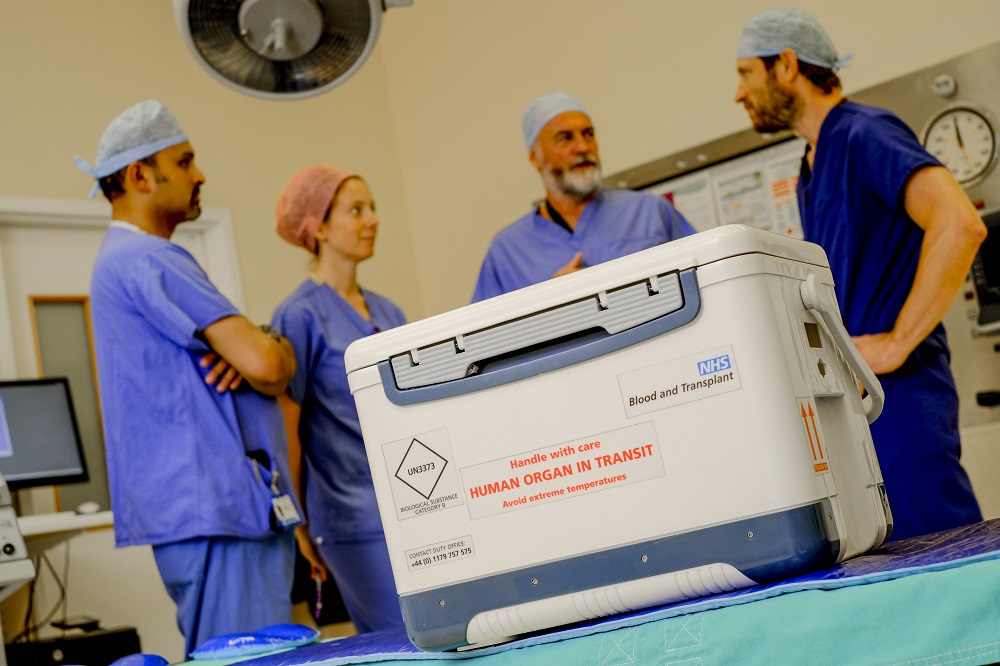Increased public support and new law offer hope for patients, despite impact of COVID-19
Family consent rates rise at the height of the pandemic.
New figures published today by NHS Blood and Transplant (NHSBT) show that last year (2019/20) 1,580 people in the UK donated their organs after they died; saving or improving the lives of 3,760 transplant recipients and giving hope to the thousands of patients still waiting.
The annual Organ Donation and Transplantation Activity Report shows deceased organ donor figures were on course to surpass the previous year’s total, but unfortunately the global COVID-19 pandemic hit in March and had a wide-reaching impact across the whole NHS and every aspect of UK society.
The high number of organ donors last year, on track to be another record, is testament to the strong support for organ donation in the UK and was possible thanks to more incredible families agreeing to support donation. The numbers of families giving their consent/authorisation for organ donation to go ahead across the UK has risen from 67% to 68% this year (1).
There was also a consistently high referral rate of potential donors by medical staff to organ donation teams (2) and more family approaches involving Specialist Nurses-Organ Donation (3). This allowed 3,760 patients to have the organ transplant they needed.
Mandi's story
Someone who knows how important the support of a Specialist Nurse in Organ Donation can be in helping through the life-saving donation process is Mandi Orton from Powys in South Wales.
 Mandi’s son Connor Hudson died in March but had always been a supporter of organ donation. As a family mum Mandi, Connor’s dad and stepdad all made the decision to uphold Connor’s wishes to donate his organs.
Mandi’s son Connor Hudson died in March but had always been a supporter of organ donation. As a family mum Mandi, Connor’s dad and stepdad all made the decision to uphold Connor’s wishes to donate his organs.
Mandi said, "Connor was such a kind and caring person, so it was no surprise to us that he wanted to donate his organs to help someone else after he died. That’s just the type of person he was.
"We were told pretty much as soon as we got to the hospital that there was nothing more the doctors could do to save Connor, so we discussed the prospect of organ donation as the nurses told us they checked and he was on the Organ Donor Register, so it was Connor’s wish to help others."
Mandi and her family didn’t know Connor was on the Organ Donor Register till it was mentioned in the hospital and his girlfriend confirmed that he’d told her about his decision.
Mandi continued: "The specialist nurses who spoke to us about organ donation were amazing. They explained the whole process to us step by step and made sure we understood each part of the process. Nothing was too much trouble. We were all allowed time with Connor to say our goodbyes and we even got locks of his hair and handprints as keepsakes – which will hopefully be a lasting memory, especially for his son Lawson.
"We may not have had that precious time with him if we hadn’t gone through the organ donation process. It gave us some hope and comfort in a very bleak situation. The fact that Connor was able to be an organ donor was a great help with the grieving process. It’s never going to be easy, but the thought that part of him lives on in others helps comfort me and know his death wasn’t in vain.
"When we found out Connor had signed to be a donor and he made the choice, we were just there to uphold his decision. He saved the lives of six people in the process and I will always be immensely proud of that."
The effect of the pandemic
In March 2020 there was a sharp reduction in organ donation activity, which meant a 1% fall in the number of deceased donors over the financial year from 1,600 to 1,580. Sadly, the total number of patients, both adults and children, whose lives were potentially saved or improved by a deceased organ transplant also fell from 3,952 to 3,760.
The strong foundations built in organ donation and transplantation over the last decade ensured some donation and transplantation activity was able to continue even during the peak of the COVID-19 pandemic. Patient safety is paramount, and the most urgent transplants continued to be prioritised.
 Even in the midst of the pandemic there were 95 deceased organ donors in the UK in March 2020. And impressively, during the health crisis the consent rate was even higher at 74.5% (March 2020).
Even in the midst of the pandemic there were 95 deceased organ donors in the UK in March 2020. And impressively, during the health crisis the consent rate was even higher at 74.5% (March 2020).
Tragically, in 2019/20, 372 people died while waiting for their call and a further 746 were mostly removed due to deteriorating health. Many of these would have died shortly afterwards. At the end of February, more than 6,000 people were still waiting for a transplant (4).
Looking to the future
The recovery of donation and transplantation is now well under way and the majority of transplant units have now reopened. Activity levels are improving as NHSBT and everyone in the NHS works hard to enable as many families as possible to gain comfort through organ donation and save and improve as many lives as possible.
Anthony Clarkson, Director of Organ Donation and Transplantation at NHSBT, said: "Amazing organ donors and their families make life-saving transplants possible, by giving their support and saying ‘yes’ to organ donation.
"It’s wonderful to see that we were, once again, on track to surpass the number of organ donors in 2019/20 than the previous year before COVID-19 hit. This is testament to the selfless families who agreed to donate their loved one’s organs in the most tragic of circumstances.
“It is disappointing but inevitable that donation and transplantation has been impacted by the worldwide pandemic. What is incredible though is that throughout this crisis, we have continued to see such strong support for organ donation and the most urgent transplants have still gone ahead and saved the lives of desperately ill adults and children.
“We are, along with our fantastic NHS colleagues, focused on the continued recovery of this immensely important work, which brings comfort to grieving families and gives people another chance at life.
“As we learn to live with COVID-19 and boosted by the new law and growing public support, we hope more lives than ever before can be saved.”
England moved to an opt out system, bringing in Max and Keira’s law, on May 20, 2020 and it is hoped public support for organ donation will continue to improve.
It’s still your choice whether or not you want to donate your organs. You can register your decision today.
Notes
1) In 2019/20, the overall consent/authorisation rate for organ donation rose from 67% to 68%
2) The overall referral rate of potential donors remained at 94%
3) The number of family approaches with a Specialist Nurse-Organ Donation rose from 91% to 92%
4) The figure for the end of February 2020 is used as during the COVID-19 pandemic, transplant patients and programmes have been suspended, meaning the waiting list figures do not accurately reflect the waiting list.
English organ donation law has changed
You still have a choice whether or not you wish to become a donor.
Organ donation law where you live
Organ donation laws vary in different countries across the United Kingdom.

Have you recorded your organ donation decision?
It takes just two minutes to register online.